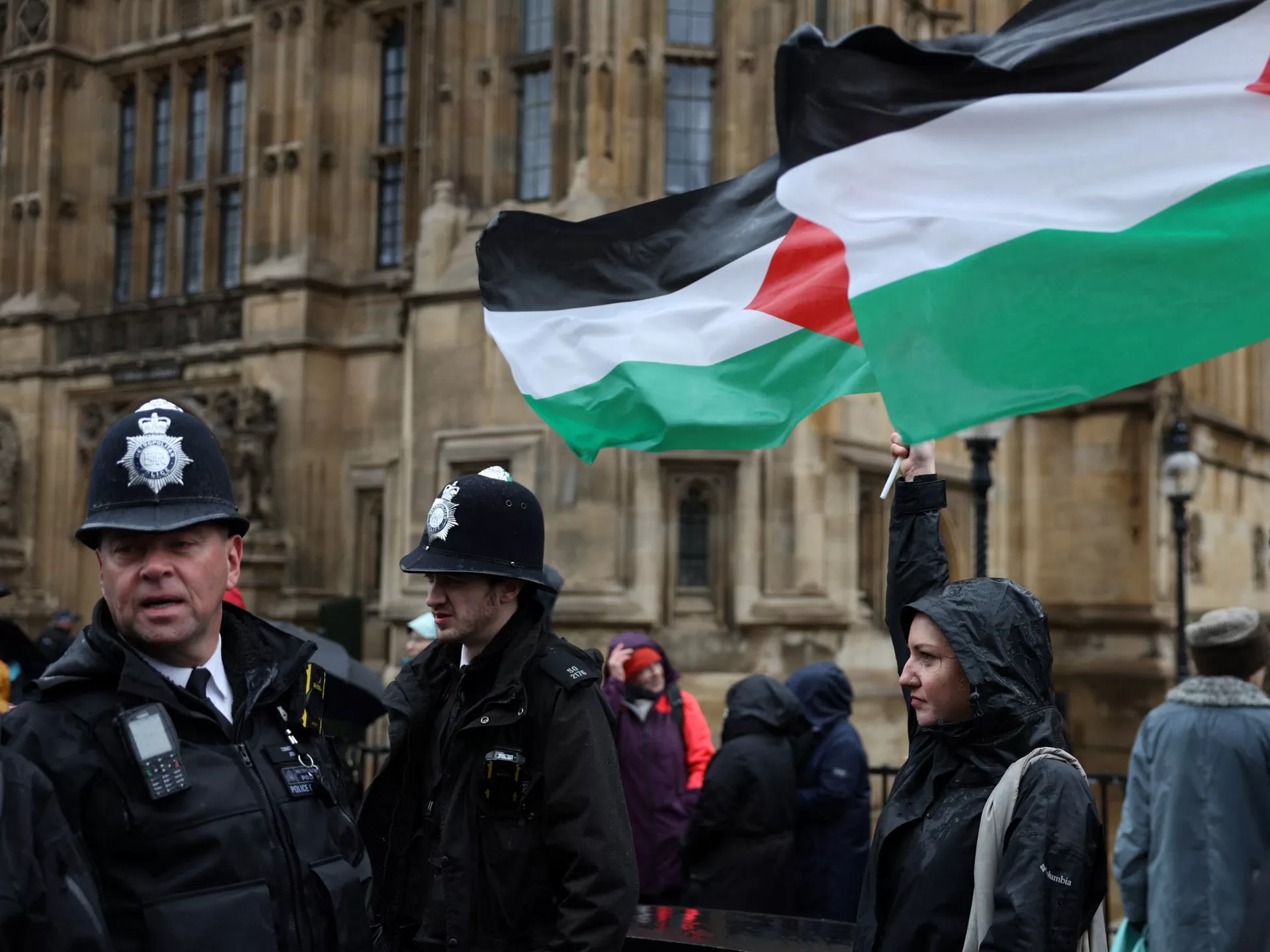London, United Kingdom – The United Kingdom has granted asylum to a Palestinian citizen of Israel, ruling that he would likely be persecuted if he returned – a decision the refugee’s legal team has described as “seismic”.
Hasan’s lawyers told an immigration tribunal that he faced an “enhanced risk of persecution” should he travel back to Israel, given Palestinian ethnicity, Muslim faith, anti-Zionist beliefs, and history of pro-Palestinian activism in the UK.
Hasan, who has lived in the UK for most of his life – more than 20 years according to his lawyers – first sought asylum in 2019.
The decision for his case was initially delayed, likely by the coronavirus pandemic and successive lockdowns, according to his lawyers.
In 2022, the Home Office rejected Hasan’s claim, denying he faced the risk of persecution in Israel.
Hasan’s legal team appealed with updated evidence submitted after October 7. On Monday, the Home Office overturned its earlier decision after reviewing the evidence.
Speaking through his lawyers, Hasan told Al Jazeera he felt “relieved” having struggled with depression and restrictions under UK law that prohibits asylum seekers from working, even voluntarily.
“I have been left in limbo for so many years while my claim was being processed, prohibited from working, renting a property, travelling, buying a car, or being able to live my life in any meaningful way,” Hasan said. “The world moved on, while I remained behind.”
But although he feels reassured, he worries for his loved ones in Israel, citing “regular incidents of low-level violence and aggression” against Palestinians.
He said Israeli soldiers had previously fired stun grenades at his family’s neighbourhood and assaulted someone.
Al Jazeera was unable to independently verify those claims.
“The authorities there are committed to the poisonous racist ideology of Zionism which at its core, holds Arabs, Muslims and Palestinians to be less than human and innately evil,” he said.
The dramatic decision comes as Israel continues to bombard Gaza for a sixth month and as its documented crackdown on dissent intensifies.
Israel’s latest campaign in Gaza began after October 7, when Hamas, the group which governs the enclave, attacked southern Israel, killing at least 1,139 people and taking roughly 250 captive.
Since then, assaults by Israeli forces have killed more than 30,000 Palestinians in the besieged Strip, mostly women and children.
While Israel says it aims to crush Hamas, rights groups and several world leaders have called for a ceasefire given the unprecedented humanitarian toll.
Monday’s decision could set a precedent for Palestinian citizens of Israel who want to claim asylum in Britain, and elsewhere.
Under the 1951 Refugee Convention, which is binding on all states, a refugee should not be returned to a country where they “face serious threats to their life or freedom”, according to the UNHCR.
The European Convention on Human Rights (ECHR), an international human rights treaty, also protects the rights of people within the 46 member states who have signed up to it, including the UK.
“It’s completely unprecedented,” said Franck Magennis, a barrister representing Hasan.
“In principle, any Palestinian finding themselves in any one of those 46 states can say, ‘If you return me to any territory under Israel’s jurisdiction, there’s a real risk that my human rights will be breached.’”
Palestinian citizens of Israel
About 1.6 million Palestinian citizens live in Israel, some 20 percent of the total population.
They can vote and participate in political life, and, unlike Palestinians living in Jerusalem, Gaza and the occupied West Bank, are not stateless.
But rights groups have long documented measures that undermine Palestinian representation in the Knesset and condemned measures that keep Palestinian citizens in Israel apart from their spouses in the West Bank or Gaza, such as denying naturalisation.
In the wake of October 7, as Israeli authorities clamp down on antiwar activists, Palestinian citizens of Israel are reportedly being increasingly arrested, harassed and suspended from their jobs and schools over social media posts.
Hasan’s lawyers provided evidence to the Home Office that the situation in Israel had worsened and referred to the interim judgement of the International Court of Justice (ICJ) on January 26, which urged Israel to prevent genocide.
They said an “apartheid” system of racial domination prioritises Jewish Israelis and systematically oppresses Palestinian citizens, a claim several groups including Human Rights Watch, Amnesty International and B’Tselem have argued in the past.
The decision is especially significant as the UK is one of Israel’s strongest allies.
Magennis has represented more than 10 Palestinians from Gaza since October 7, all of whom have been granted asylum, he said. But the ruling in favour of Hasan is “seismic”, he said.
“What we’re witnessing in this case is different parts of the British state unable to reach an agreement about whether or not to ignore the reality of Israeli apartheid,” he said.
Monday’s U-turn has overruled a planned tribunal hearing, during which the Home Office was expected to defend its original decision and again reject Hasan’s claim.
A Home Office spokesperson said they cannot comment on individual cases, but added: “All asylum claims are carefully considered on their individual merits in accordance with the immigration rules. Where more information is provided or becomes available, the outcome of a decision can change.”
